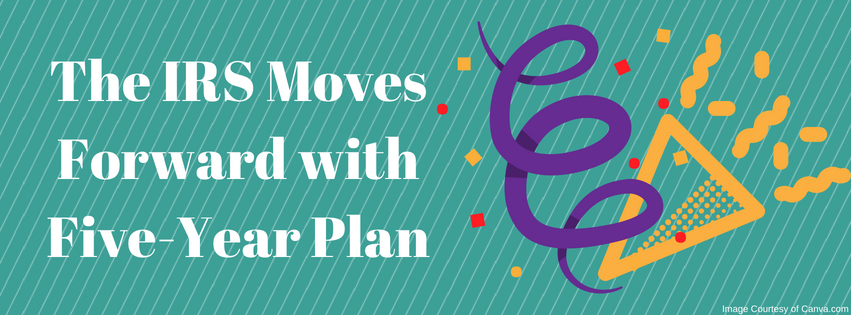The recent Tax Cuts and Jobs Act (TCJA) has made some big changes to the nation’s tax landscape, and in the spirit of renovation, the IRS has made it clear they’re not going to stop there. Starting in 2018 and ending in 2022, the IRS has announced the details to their five-year plan with the aim of improving tax administration, taxpayer service, and the efficiency of their operations.
According to The Fiscal Year 2018-2022 IRS Strategic Plan, the approach will be guided by six main goals:
- To give taxpayers the ability to meet their tax requirements;
- To encourage the compliance and enforcement of the Tax Code through improved administration;
- To actively work with external partners to help achieve said improvement;
- To amass an engaged, diverse, well-equipped, and flexible workforce;
- To improve systems of data access, analytics, and functionality for efficient and informed decision-making; and
- To increase the speed, effectiveness, and security of IRS operations through advanced technology and systems.
Currently, the IRS is focusing a majority of their attention on fulfilling this sixth goal, as it’s widely believed that better technology will aid the resolution process for the remaining five goals, as well as help solve common taxpayer pain points through improved digital access like long waits on hold.
Having already allocated $291M out of their budget of $11.4B to go towards purchasing new technology for their workplaces, the IRS is well on track. But experts like CPA and tax partner, Melissa Horne, at the CPA firm Smith & Howard in Atlanta, questions whether that will be enough.
“The $291 million doesn’t seem like that much to spend on technology, given the overall budget and the fact that this is by far the biggest tax reform we’ve had since 1986,” Horne says. “There is an unbelievable amount of changes that the IRS has to incorporate. They have to come out with guidance on a host of issues. Then they have to decide exactly how it will be implemented and take that and build their systems out to handle it… If they stay within that budget I’ll be impressed, especially since they anticipate a lot of additional man hours.”
Those changes Horne is talking about? In between revising taxpayer forms to be in accordance with the TCJA, releasing publications detailing the new regulations, providing the technical support to answer questions on the meaning of those publications and the law, training IRS employees to understand the new tax code, and reprogramming technological systems to be able to process the renovated returns, its safe to say the IRS has their work cut out for them.
Still, as Eldelstein’s CPA and principle, Emily Matthews, says best: “We’re thrilled to see the IRS address some of the known issues within the agency. Not only is it helpful to taxpayers, but to professionals like us.”
